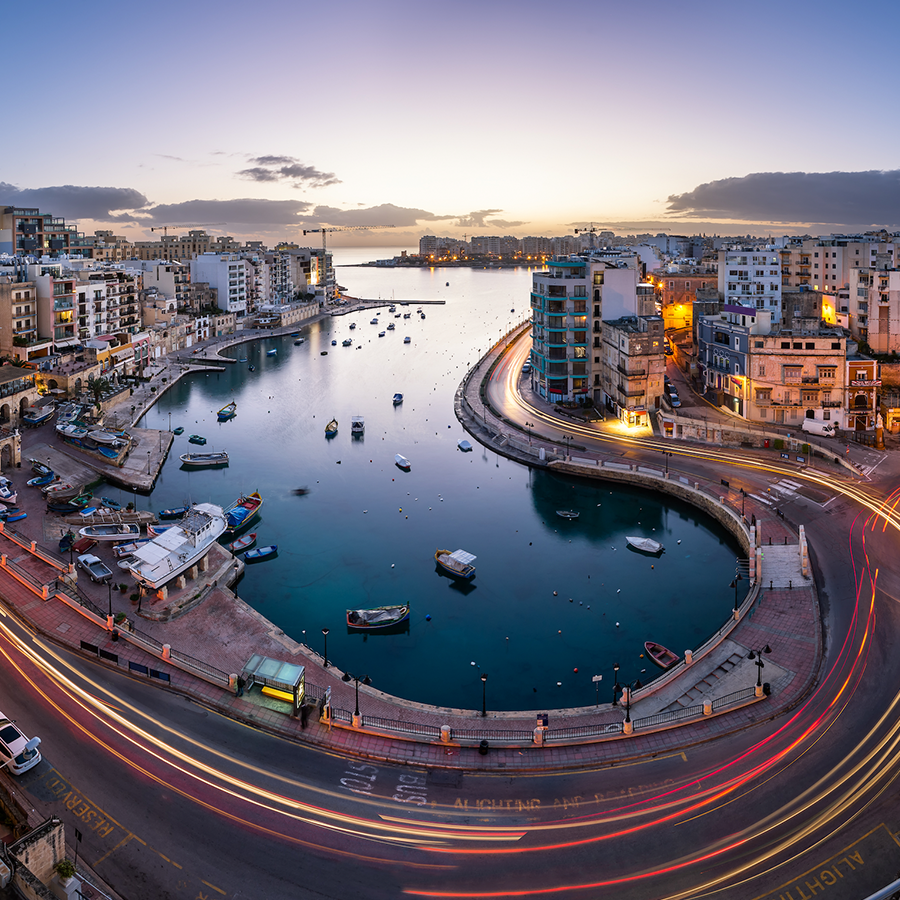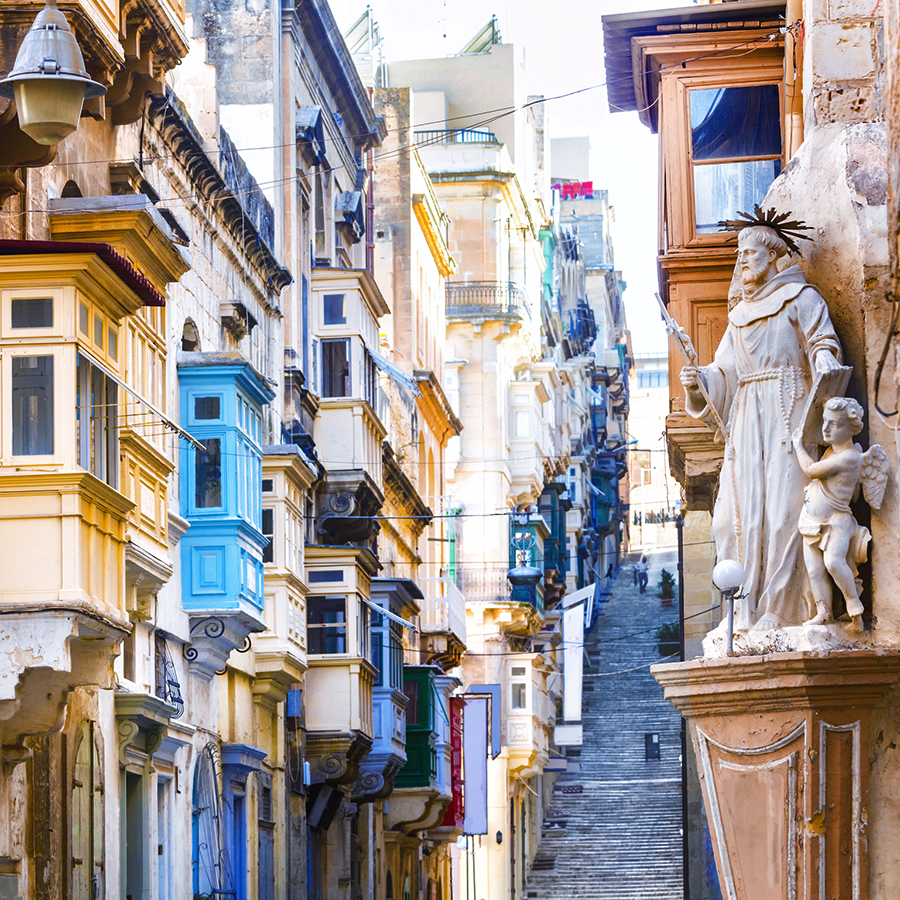The EU’s smallest country has skyrocketed in importance since it joined in 2004, with an emerging financial services sector and strong foreign direct investment programs. While Malta’s economy was hit hard during the pandemic, the country’s gross domestic product rebounded by 5.9% in 2021, higher than its strong growth rates in 2019 before the crisis. The latest projections by the Central Bank of Malta estimate year-on-year economic growth of 6.8% in 2022. Malta is actively taking advantage of its strong potential as a hub for digital activities. The service-based economy has diversified, with the government prioritizing investments in its new digital banking sector along with information and communications technology, med-tech, high-end manufacturing, online gaming and other knowledge-based segments.
One of Malta’s essential economic components is its tourism sector, which provided 16.9% of all employment and expenditures of around $2.4 billion in 2019. Strong funding during the COVID-19 period kept the sector afloat, with a total budget of almost $160 million in 2020. The government is now looking to take advantage of the new sustainable tourism trend as visitors return, with total tourist expenditures rising by 91% in 2021. According to the OECD, pre-pandemic rates of the vital sector is expected to return in 2024 or 2025.
6,6 %
Estimated real GDP growth rate for 2022
Top in EU
Malta ranked 1st in eGovernment services by EC
€208.6 B
total FDI stock first half 2022
1st
Jurisdiction in the world to regulate blockchain in 2018
3
Unesco World Heritage sites including capital city Valletta
2.3M
Tourists visited Malta last year
Interviews
Interview with Clayton Bartolo, Minster of Tourism, Malta
“With tourism being such an important component of the local economy, we want the wealth which is being generated by this industry to be distributed all around the localities.”
22 May, 2023Interview with Dr. Miriam Dalli, Minister for Environment, Energy and Enterprise, Malta
“We can't just limit ourselves to looking at onshore technology; we need to look at offshore technology.”
22 May, 2023Interview with Ian Borg, Minister of Foreign and European Affairs and Trade, Malta
“As a small island state, we're also willing to share best practices with the least developed small island states and other less developed countries because climate change is a big concern.”
22 May, 2023Interview with Owen Bonnici, Minister for the National Heritage, the Arts, and Local Government, Malta
“We have a lot of people in Malta for whom art is their job, their workplace. They earn money out of arts, and the fact that we have those new initiatives creates new opportunities for the artists.”
22 May, 2023Interview with Stephen Xuereb, CEO of Valletta Cruise Port, Malta
“We took over the cruise business at the point where there were around 250,000 passengers visiting Malta. In 2019, we hit a record year with 930,000 passenger movements.”
22 May, 2023Interview with Kenneth Brincat, CEO of the Malta Digital Innovation Authority
“If you look into our strategy, you will understand that the MDIA, rather than being a regulator is more looking to provide technology assurance and facilitate the optimal use of technology.”
22 May, 2023Interview with Kurt Farrugia, CEO of Malta Enterprise
“Our factories never closed. We’ve helped them to put in place safe measures within their factories to be able to continue running their operations. We've helped companies with assisting their employees.”
22 May, 2023Interview with Charles Mizzi, CEO of Residency Malta Agency
“There was already a community mainly made up of internationals. Obviously, they have freedom of movement, they could come to Malta anytime and there was this growing community: young people coming to Malta to work remotely from here.”
23 May, 2023Interview with George Vella, Chairman of FinanceMalta
“All the major players say they cannot afford not to be here because they can find everything in the ecosystem that was created. The supply chain that they need to rely on is entirely set in Malta.”
23 May, 2023Interview with Kevin Chircop, Executive Chairman of Enemed, Malta
“Malta has the largest ship registry in Europe and the fourth largest in the world. It is only complimentary to have storage facilities for bunkering, for servicing the maritime industry from the island itself.”
23 May, 2023Interview with Greta Camilleri Avallone, Manager Director of M&Z, Malta
“We are prepared to invest more. It's not like we're relying on other people to put up the investment. We have the expertise, and we want to increase our business with American companies if possible.”
23 May, 2023Interview with Jonathan Cardona, CEO of Enemalta, Malta
“We have very ambitious targets for the upcoming years. Our focus really and truly is in ensuring that we can meet this fast-increasing demand.”
23 May, 2023Interview with Joseph Cuschieri, Founder and Partner of CP Advisory Malta
“We need to future proof our jurisdiction for the long term so that it remains relevant and innovative, with a new economic vision which ensures the ongoing development and modernization of our economy.”
24 May, 2023Interview with Kenneth Farrugia, CEO of Bank of Valletta, Malta
“While Malta's tourism industry was down by 95% due to COVID-19, the country did not suffer the same impacts as other European countries, allowing for a quicker recovery as a result of the national government’s support for the economy, including wage
24 May, 2023Interview with Dr. Michel I. Najjar, President of American University of Malta
“We don't want only to graduate technical people. We want to graduate citizens of the world and people who are proud of this.”
24 May, 2023




















